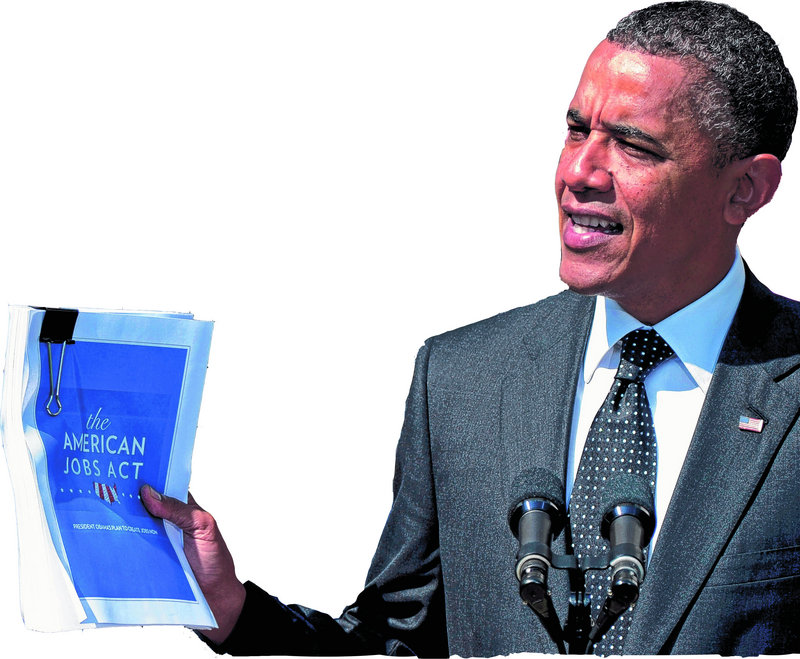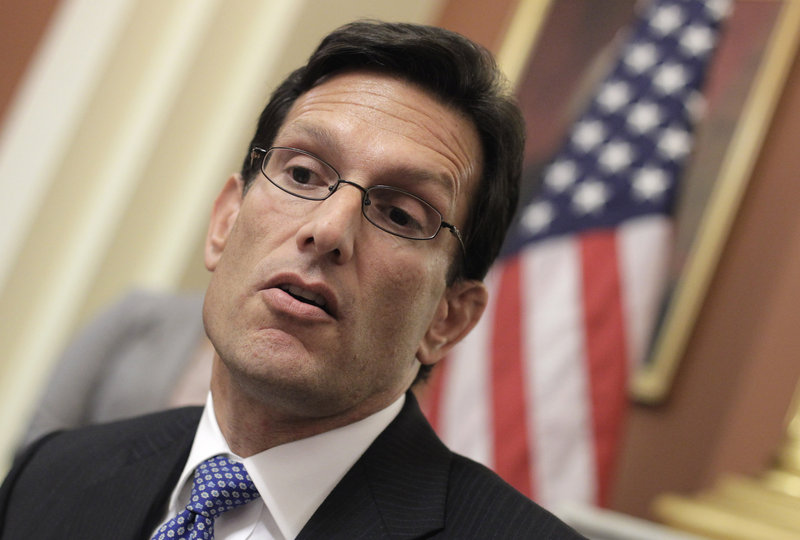WASHINGTON — President Obama announced plans Monday to fund his $447 billion jobs bill largely by raising taxes on wealthier families, provoking immediate opposition from congressional Republicans.
The sequence of events suggests that despite the recent pledges of greater bipartisanship, many of the fiscal and economic stumbling blocks that have left Washington gridlocked in recent months remain firmly in place.
At a Rose Garden ceremony to promote the bill before he formally sent it to Congress, the president urged the public to pressure lawmakers to quickly approve the package.
“This is the bill that Congress needs to pass,” Obama said. “No games. No politics. No delays.”
There was little delay in the GOP response, even if it was relatively measured.
“We remain eager to work together on ways to support job growth, but this proposal doesn’t appear to have been offered in that bipartisan spirit,” said Michael Steel, chief spokesman for House Speaker John Boehner, R-Ohio.
The White House said Congress should pay for the jobs plan by imposing new limits on itemized deductions for individuals who earn more than $200,000 a year and families earning more than $250,000.
Eliminating those deductions would bring in an additional $400 billion in revenue, aides said. The administration also recommended ending subsidies for oil and gas companies and changing the depreciation rules for corporate airplanes.
Altogether, White House aides said, the tax package would raise $467 billion, more than enough to pay for the new jobs bill.
The cost of the jobs plan would be in addition to the $1.5 trillion in spending cuts or new revenue that a bipartisan congressional “supercommittee” is tasked with finding to reduce the country’s spiraling deficit. But the administration said it is open to other ways to pay for its proposal.
If the committee settles on a plan to reduce the deficit by more than $1.5 trillion, the tax increases would not necessarily be needed any longer, White House officials said.
Surrounded by workers who he said would benefit from passage of the plan, Obama said his proposal would put construction workers, teachers and veterans back to work while providing tax relief for small businesses.
Republican leaders offered a dual and at times contradictory response: They were eager to work with the president even as they lamented that his proposal would hurt economic growth.
House Majority Leader Eric Cantor, R-Va., said he feared the president’s plan would mean “a massive tax increase at the end of 2012 on job creators that we’re actually counting on to reduce unemployment.”
Armed with polls that show approval ratings for Congress have plummeted even faster and further than the president’s own declining popularity, the GOP greeted Obama’s package of tax cuts and infrastructure spending with an openness largely absent from Washington in recent months.
Republicans have said there is promise in Obama’s proposal to slash payroll taxes for small businesses and employees. They have also applauded advancing free-trade agreements with South Korea, Colombia and Panama.
“Let us all try and take a breather and focus on what we can do together, try and lower the volume of rancor here and see if we can get along,” Cantor said Monday.
But Republicans have rejected other portions of the package, including new spending on road projects, teacher salaries and school construction.
Rep. Allen West, R-Fla., tweeted that Obama was seeking to raise taxes for a ” ‘mini-me’ stimulus.”
“In military, we call that SOS (Same ole Stuff),” he wrote.
Sen. Jon Kyl, R-Ariz., said the president’s plan relied on “flawed economic theories” that assume government spending can spur economic consumption.
Obama will travel to Columbus, Ohio, today and Raleigh, N.C., on Wednesday to pitch the plan as a new and critically important way to jump-start the economy.
He said he will outline a broader plan to reduce the deficit over the next decade next Monday. But he said his proposals for paying for his jobs package ask more from those who can afford it in exchange for getting the unemployed back to work.
“The bottom line is, when it comes to strengthening the economy and balancing our books, we’ve got to decide what our priorities are,” he said.
Obama will find a supportive chorus in congressional Democrats, who Monday urged their GOP colleagues to accept the package.
“Republicans must join us to address the American people’s top priority: job creation,” House Minority Leader Nancy Pelosi, D-Calif., said in a written statement.
In the past, however, Democrats, too, have been wary of the most significant piece of Obama’s tax proposal, the elimination of many tax deductions for the wealthy. When Democrats held Congress, they declined to consider a White House proposal to limit deductions for upper-income taxpayers as a way to pay for health care reform.
So far, Obama is presenting his complex plan as a single idea, and encouraging Republicans to accept the initiative in its entirety. Republicans have countered that discrete components of the plan should be considered individually, and suggested that it will fail if Obama insists on having it considered as a single piece of legislation.
“I don’t think the president is in any position to say it’s ‘take it or leave it, all or nothing,’ ” Kyl said. “I thought he was Mr. Compromise. But maybe I was wrong about that.”
Send questions/comments to the editors.





Success. Please wait for the page to reload. If the page does not reload within 5 seconds, please refresh the page.
Enter your email and password to access comments.
Hi, to comment on stories you must . This profile is in addition to your subscription and website login.
Already have a commenting profile? .
Invalid username/password.
Please check your email to confirm and complete your registration.
Only subscribers are eligible to post comments. Please subscribe or login first for digital access. Here’s why.
Use the form below to reset your password. When you've submitted your account email, we will send an email with a reset code.